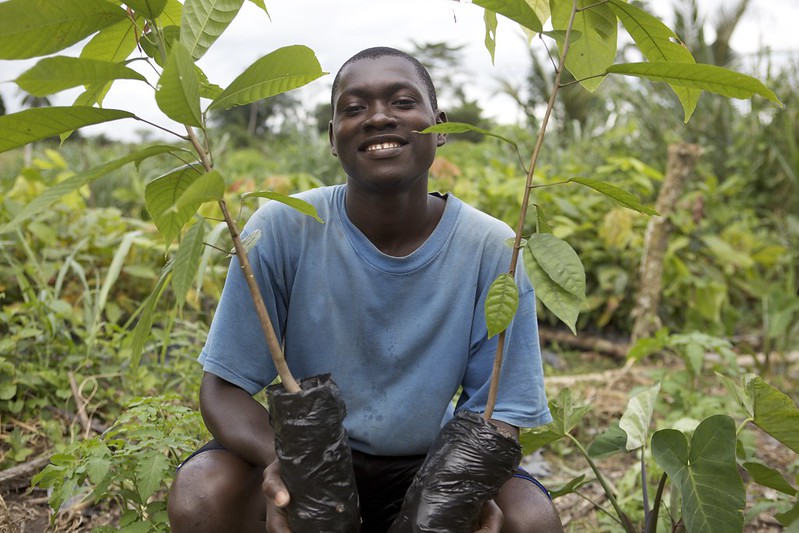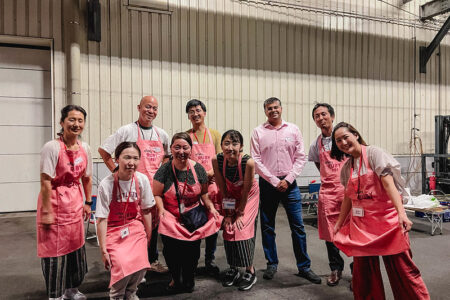Nestlé names sustainably sourced cocoa among key areas for 2050 climate impact goals

The Nestlé group has placed supporting sustainably sourced cocoa as among key targets for achieving its ambitious 2050 net-zero climate impact goals, writes, Neill Barston.
As the Swiss-based business noted, around two-thirds of its total emissions are linked to agriculture, which it intends to address through tackling supply issues including improving farming techniques, as well as providing vital support for farmers’ income levels.
With the company’s major ingredients for its operations in Europe, Middle East, and North Africa being cocoa, coffee and milk supplies, it will focus on healthy soils, net-zero dairy farms, and sustainably sourced cocoa and coffee.
Notably, by 2025,100% of the cocoa and coffee Nestlé uses will be sustainably sourced. For this, it is cooperating with farmers to avoid deforestation and rolling out an ambitious reforestation plan. In 2020, the company kicked off a public-private partnership to conserve and restore the Cavally Forest, one of the last remaining biodiversity hotspots within Ivory Coast.
Marco Settembri, Nestlé CEO for Europe, Middle East and North Africa, commented: “Our projects on healthy soils, low emission dairy farms, and sustainably sourced cocoa and coffee show promising outcomes. We are confident that those collaborations with farmers and suppliers can be extended to reach our net-zero climate goal.”
As the company explained, it already carries several initiatives to achieve its 2050 net-zero ambition. This includes schemes such as its Living Soils in France and LENs in the UK, which have enabled farmers to use no or fewer pesticides and apply techniques such as permanent soil cover, crop rotation, and reduced tillage. Such activities help keep more carbon and water locked up in the ground and create healthier soils.
Significantly, in relation to dairy, the company has pledged to scale up its activity within supply chains, developing a goal of net-zero emissions dairy farms. According to results from projects including Climate-friendly Milk in Switzerland and First Milk in the UK, have yielded reductions in carbon emissions on over 220 dairy farms. Actions include implementing a range of better farming initiatives, such as keeping cows longer, using more local feed, and working on cows’ health.
Katja Seidenschnur, Nestlé Sustainability Director for Europe, Middle East and North Africa, added: “We work with farmers, shift our portfolio to more plant-based products and introduce carbon-neutral brands. We also rethink our manufacturing and distribution processes as well as make our packaging more circular. All those actions will help us progress on our journey down to zero. We leverage our global R&D network to deliver on our climate commitments. Let’s work together with the whole value chain and governments to get this done.”
By 2025, Nestlé will have all 800 global Nestlé sites using 100% renewable electricity. In 80 factories out of around 130 across Europe, the Middle East, and North Africa, the company relies on 100% renewable electricity.
For instance, in the United Arab Emirates, Nestlé is installing 25,000 photovoltaic (PV) panels at three manufacturing sites. It will generate 10 GWh of electricity per year – eliminating at least six million kilograms of CO2 emissions annually, the equivalent of annual emissions from nearly 1,500 passenger cars.
Transparency work recognised
In wider company news, the business has today again been recognised in the 2021 Bloomberg Gender Equality Index (GEI) for its transparency in gender reporting and advancing women’s equality in the workplace.
The reference index measures gender equality across five pillars: female leadership and talent pipeline, equal pay and gender pay parity, inclusive culture, sexual harassment policies, and pro-women brand.
Nestlé was included in this year’s index for scoring at or above a global threshold established by Bloomberg to reflect a high level of disclosure and overall performance across the framework’s five pillars. Specifically, the GEI recognized that Nestlé had made significant progress in fostering an inclusive culture at the company and advancing gender pay and equal pay parity, and pro-woman brand.



